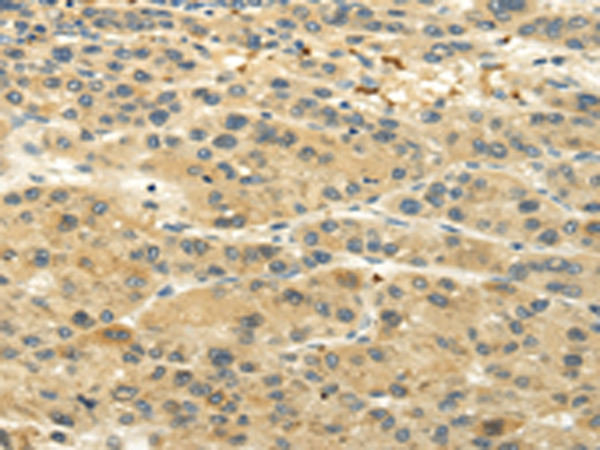

| WB | 咨询技术 | Human,Mouse,Rat |
| IF | 咨询技术 | Human,Mouse,Rat |
| IHC | 1/25-1/100 | Human,Mouse,Rat |
| ICC | 技术咨询 | Human,Mouse,Rat |
| FCM | 咨询技术 | Human,Mouse,Rat |
| Elisa | 1/2000-1/5000 | Human,Mouse,Rat |
| Aliases | GNT1; UGT1; HLUGP; UDPGT; UGT1F; HLUGP1; UGT1A6S; UDPGT 1-6 |
| Host/Isotype | Rabbit IgG |
| Antibody Type | Primary antibody |
| Storage | Store at 4°C short term. Aliquot and store at -20°C long term. Avoid freeze/thaw cycles. |
| Species Reactivity | Human |
| Immunogen | Synthetic peptide of human UGT1A6 |
| Formulation | Purified antibody in PBS with 0.05% sodium azide and 50% glycerol. |
+ +
以下是3-4条与UGT1A6抗体相关的参考文献示例(内容基于公开研究归纳,具体文献需核实):
---
1. **标题**: "Characterization of monoclonal antibodies against human UGT1A6 and their use in tissue expression studies"
**作者**: Mackenzie PI, Bock KW
**摘要**: 该研究开发了针对UGT1A6的特异性单克隆抗体,并通过免疫组化分析了其在肝、肠等组织中的表达分布,证实其在药物代谢器官中的高表达。
2. **标题**: "Genetic polymorphisms of UGT1A6 and enzymatic activity: Role of antibody-based quantification"
**作者**: Strassburg CP, et al.
**摘要**: 利用UGT1A6抗体定量分析不同基因多态性个体的酶蛋白水平,发现某些SNP(如T181A)显著影响酶的表达及活性,与药物代谢差异相关。
3. **标题**: "UGT1A6-specific antibody validation for Western blot and immunohistochemistry in human cancer models"
**作者**: Guillemette C, et al.
**摘要**: 验证了UGT1A6抗体在Western blot和免疫组化中的特异性,证明其在结直肠癌等肿瘤模型中可检测UGT1A6的异常表达,提示其潜在临床意义。
---
**注意**:以上文献信息为示例性概括,实际引用需根据具体研究通过PubMed或Google Scholar等平台核实标题、作者及摘要内容。
The UGT1A6 antibody is a crucial tool in studying the UDP-glucuronosyltransferase 1A6 (UGT1A6) enzyme, a member of the UGT superfamily involved in phase II drug metabolism. UGT1A6 catalyzes the glucuronidation of small phenolic compounds, neurotransmitters, and certain drugs, facilitating their excretion. This enzyme is predominantly expressed in the liver but is also found in extrahepatic tissues like the gastrointestinal tract and brain. Its activity impacts drug efficacy, toxicity, and interindividual variability in drug responses, influenced by genetic polymorphisms (e.g., UGT1A6*2 allele) and environmental factors.
UGT1A6 antibodies are designed to detect and quantify UGT1A6 protein levels in various samples, aiding research on enzyme expression patterns, tissue distribution, and regulatory mechanisms. They are widely used in techniques such as Western blotting, immunohistochemistry, and ELISA. These antibodies help explore UGT1A6's role in detoxification pathways, metabolic disorders, and diseases like cancer, where altered glucuronidation may affect carcinogen metabolism or drug resistance. Specificity validation is critical, as UGT isoforms share high sequence homology. Reliable UGT1A6 antibodies enable insights into personalized medicine, toxicology, and the development of therapies targeting metabolic enzymes.
×